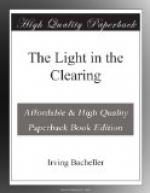“Hello, Bart!”
I observed that Henry Wills joined them and walked down the street at the side of Sally. I got my first pang of jealousy then.
When school was out that afternoon Mr. Hacket said I could have an hour to see the sights of the village, so I set out, feeling much depressed. My self-confidence had vanished. I was homesick and felt terribly alone. I passed the jail and stopped and looked at its grated windows and thought of Amos and wondered if he were really a murderer.
I walked toward the house of Mr. Wright and saw him digging potatoes in the garden and went in. I knew that he was my friend.
“Well, Bart, how do you like school?” he asked.
“Not very well,” I answered.
“Of course not! It’s new to you now, and you miss your aunt and uncle. Stick to it. You’ll make friends and get interested before long.”
“I want to go home,” I declared.
“Now let’s look at the compass,” he suggested. “You’re lost for a minute and, like all lost people, you’re heading the wrong way. Don’t be misled by selfishness. Forget what you want to do and think of what we want you to do. We want you to make a man of yourself. You must do it for the sake of those dear people who have done so much for you. The needle points toward the schoolhouse yonder.”
He went on with his work, and, as I walked away, I understood that the needle he referred to was my conscience.
As I neared the schoolmaster’s the same drunken man that I had seen before went zigzagging up the road.
Mr. Hacket stood in his dooryard.
“Who is that?” I asked.
“Nick Tubbs—the village drunkard and sign o’ the times,” he answered. “Does chores at the tavern all day and goes home at night filled with his earnings an’ a great sense o’ proprietorship. He is the top flower on the bush.”
I went about my chores. There was to be no more wavering in my conduct. At the supper table Mr. Hacket kept us laughing with songs and jests and stories. The boy John, having been reproved for rapid eating, hurled his spoon upon the floor.
“Those in favor of his punishment will please say aye?” said the schoolmaster.
I remember that we had a divided house on that important question.
The schoolmaster said: “Michael Henry wishes him to be forgiven on promise of better conduct, but for the next offense he shall ride the badger.”
This meant lying for a painful moment across his father’s knee.
The promise was given and our merry-making resumed. The district attorney, whom I had met before, came to see me after supper and asked more questions and advised me to talk with no one about the shooting without his consent. Soon he went away, and after I had learned my lessons Mr. Hacket said:
“Let us walk up to the jail and spend a few minutes with Amos.”
We hurried to the jail. The sheriff, a stout-built, stern-faced man, admitted us.




